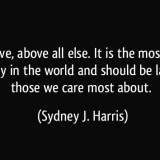Is a “Portfolio Career” in your future?
“Job security is gone. The driving force of a career must come from the individual.” ~ Homa Bahrami
If you have left your full-time job and found yourself piecing and patch-working an income together from various odd jobs, part time gigs, short-term contracts and one-shot projects, you may not realize that you could be launching a “Portfolio Career.”
Some have hailed portfolio careers as the next emerging trend for workers. The portfolio worker doesn’t work just one job at one company, but simultaneously uses various skills developed throughout their career to earn a living doing different types of work.
The concept of the portfolio worker is attributed to management theorist Charles Handy who, in the 1990s, predicted that workers will combine different jobs, projects and skill sets – either related or unrelated – to create a full-time job income.
For instance, rather than spend eight or 10 hours a day working in an accounting office, the portfolio worker might work two days as an accountant, and combine that with consulting, teaching, part time work at another company, public speaking, shooting photos of weddings, and selling those photos at art fairs.
Talk about diversity in the workplace!
In my own case, I had no idea that my small business and freelance efforts were morphing into a portfolio career. After I was laid off at the height of a 25-year career in Public Relations, I decided “the hell with working in cubicle-ville,” and opened a small PR agency. Little by little I started taking on jobs and projects that were outside of the traditional PR realm – projects that really interested me, but which I hadn’t necessarily explored during my full-time career.
Soon, I was not only providing PR services to clients, but I also was earning a living doing ghostwriting, graphic design, freelance magazine writing, and even working a few hours a week as a part time state government employee. In addition, I started doing some paid public speaking, and I am currently writing a book.
The beauty of this is that you can pursue it all at the same time without the constriction of a traditional job description that you must stay within.
“The best career advice to give to the young is ‘Find out what you like doing best and get someone to pay you for doing it.'” ~ Katherine Whitehorn
Another portfolio career characteristic is that you will work at different rates. For example, the hourly rate for my government work is significantly less than what I charge for my writing or consulting time. But, the trade-off is that I enjoy the work I do for that government agency and it gives me an opportunity to give back to my community.
The portfolio life DOES require a mind-shift. You become the CEO of your own career. You no longer have one job and one employer and one focus, but multiple jobs and multiple employers within one or more professions and skill sets.
What a portfolio career is:
- It offers you independence and flexibility with your time
- You can work with employers you want to work with
- Your relationships with your various “bosses” is more egalitarian and on an equal basis
- It allows you to pursue your interests as part of your work
- It provides more variety in projects, colleagues and environment
- It reflects your own work values
AND, it can be complex, stressful, and insecure.
What a portfolio career is not:
- A portfolio career is not for someone who likes consistency and security.
- It doesn’t provide corporate employment benefits and you will have to either rely on a significant other’s health insurance or pay for your own individual coverage, which can be expensive.
- In addition, you will need to plan for your own retirement, and make sure to pay taxes on your income. Get a good CPA!
- You will likely have irregular hours and may work on weekends and evenings.
However, on the flip side, if you need to go get your hair cut at 10 a.m. on Tuesday, or meet a colleague at 4 p.m. on Thursday for idea brainstorming and a glass of wine, you have the flexibility to do that. The point is, you can have the freedom to work the hours you want, as long as they fit with the jobs you are going after.
As a portfolio worker you also need to be willing to redefine yourself in terms of your profession. If you are stuck on what you do for a living and all the labels and titles that are attached, it might be difficult to see yourself as a “Jack-or-Jill-of-many-trades.”
Unlike our parents and grandparents who traditionally worked their entire adult lives with one company and then retired at age 65, today’s employees tend to move in and out of jobs every few years. Some of this is due to the economy and job losses, but primarily I see it as a cultural change, where people stay in jobs only as long as they offer growth and satisfaction. Many people are finding that leaving a job, whether by choice or necessity, can be an opportunity to create their own career path.
I guess if I were to distill it down to just a few words here’s what I would say:
- Traditional job descriptions and positions are created by companies, agencies and corporations, and you must fit into them.
- Your portfolio career is created and managed by you, and you can design it to fit your own values and interests.

























1 Response
[…] This post was mentioned on Twitter by rizen creative, Patti Murphy. Patti Murphy said: Is a “Portfolio Career” in your future? » Murphy Writes http://t.co/EAdBkk3 via @AddThis […]